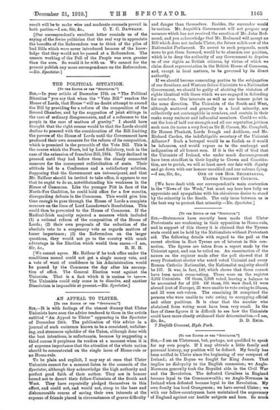THE POLITICAL SITUATION.
[To TIER EDITOR OP THE "Brzorrros."1 SIR, In your article of December 17th on " The Political Situation " you say that when the " Veto Bill " reaches the House of Lords, that House "will no doubt attempt to amend the Bill by providing for a reform of the composition of the Second Chamber, and by the suggestion of joint sittings in the case of ordinary disagreements, and of a reference to the people in the case of matters of gravity." I should have thought that the right course would be that the Lords should decline to proceed with the consideration of the Bill limiting the powers of the House of Lords until the Government have produced their own measure for the reform of its composition, which is promised in the preamble of the Veto Bill. This is the course which the Peers, led by Lord Salisbury, took in the case of the extension of franchise Bill, 1884. They declined to proceed until they had before them the closely connected measure for the consequent redistribution of seats. Their attitude led to a Conference and a satisfactory solution. Supposing that the Government are intransigeant, and that Mr. Balfour should be invited to take office, it appears to me that he ought to do so, notwithstanding his weakness in the House of Commons. Like the younger Pitt in face of the North-Fox Coalition, he could hold office for a few months, disregarding defeats in the Commons. This would give him time enough to pass through the House of Lords a complete measure on the lines of Lord Lansdowne's Resolutions. This could then be presented to the HOUSE! of Commons. If the Radical-Irish majority rejected a measure which included (1) a rational reform of the composition of the House of Lords; (2) their own proposals of the reduction of the absolute veto to a suspensory veto as regards matters of lesser importance ; (3) the Referendum on the larger questions, they would not go to the country with much advantage in the Election which would then ensue.—I am, [We cannot agree. Mr. Balfour if he took office under the conditions named could not get a single money vote, and a vote of want of confidence in his Administration would be passed by the Commons the day after his assump- tion of office. The General Election went against the Unionists. That is a fact which it is useless to ignore_ The Unionists could only come in to dissolve, and another Dissolution is impossible at present.—En. Spectator.]






































 Previous page
Previous page